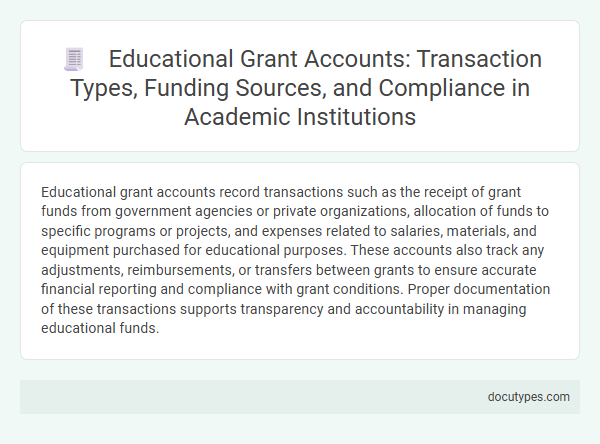Educational grant accounts record transactions such as the receipt of grant funds from government agencies or private organizations, allocation of funds to specific programs or projects, and expenses related to salaries, materials, and equipment purchased for educational purposes. These accounts also track any adjustments, reimbursements, or transfers between grants to ensure accurate financial reporting and compliance with grant conditions. Proper documentation of these transactions supports transparency and accountability in managing educational funds.
Introduction to Educational Grant Accounts in Academic Institutions
Educational grant accounts in academic institutions serve as dedicated financial records for tracking funds received through various grants. These accounts ensure transparent management and proper allocation of resources designated for specific educational purposes.
Types of transactions recorded in educational grant accounts include initial grant disbursements, budgeting expenditures for approved activities, and adjustments or refunds related to grant usage. Detailed documentation of salaries, equipment purchases, and project-related costs is maintained to comply with grant conditions. Regular monitoring and reporting facilitate accountability and support the institution's adherence to funding requirements.
Key Transaction Types in Educational Grant Management
Educational grant accounts track a variety of financial transactions essential for effective grant management. Understanding the key transaction types helps ensure accurate reporting and compliance.
- Grant Award Deposits - Records the initial funds received from granting agencies to support educational programs.
- Expenditure Transactions - Reflects payments made for approved budget items such as supplies, salaries, and facility costs related to the grant.
- Reimbursement Claims - Documents requests for repayment of expenses incurred on behalf of the grant project according to the grant terms.
Common Funding Sources for Educational Grants
Educational grant accounts track various financial transactions to ensure proper allocation and use of funds. These transactions reflect the inflow and outflow related to grants from multiple funding sources.
- Federal Grants - Transactions include funds received from government agencies like the Department of Education for specific educational programs.
- State and Local Government Grants - These transactions record monetary support provided by state departments or local authorities to support school initiatives and infrastructure.
- Private and Corporate Funding - Contributions from private foundations, corporations, and philanthropic organizations are tracked to support scholarships, research, and educational projects.
Internal vs. External Grant Funding Mechanisms
| Transaction Type | Description | Internal Grant Funding Mechanism | External Grant Funding Mechanism |
|---|---|---|---|
| Grant Award Receipt | Recording initial funds received for educational projects | Transfers within the institution's budget allocated to specific departments or initiatives | Funds received from government agencies, private foundations, or corporate sponsors |
| Expenditure Tracking | Monitoring spending on approved grant activities | Expenses related to internal programs, faculty research, or departmental activities funded by institutional allocations | Costs for research supplies, staff salaries, travel, and other expenses as specified by external funders |
| Budget Adjustments | Changes made to the approved grant budget | Reallocation of funds internally to meet shifting priorities or project needs | Requests for budget modifications submitted to and approved by external funding agencies |
| Revenue Recognition | Accounting for income generated through grant-supported activities | Income from internal grant-related tuition waivers or institutional overhead charges | Royalties, licensing fees, or service income arising from externally funded projects |
| Grant Closure and Reporting | Finalizing accounts and submitting required reports | Internal reconciliation and documentation for institutional review | Financial reports, compliance documentation, and audits required by external sponsors |
Essential Compliance Requirements for Grant Transactions
Educational grant accounts record transactions related to the receipt, allocation, and expenditure of grant funds. These include payments for salaries, supplies, equipment, and program-related services necessary to fulfill the grant's objectives.
Compliance requires strict adherence to federal and state regulations, ensuring that all expenses align with the grant's approved budget and purpose. Accurate documentation and timely reporting are essential to maintain transparency and secure future funding opportunities.
Documentation and Record-Keeping Standards
What types of transactions are recorded in educational grant accounts? Educational grant accounts primarily document expenses directly related to the grant's objectives, such as tuition fees, research costs, and educational materials. Accurate record-keeping standards require detailed documentation, including receipts, invoices, and approval forms, to ensure transparency and compliance with funding regulations.
Financial Reporting Obligations for Grant Funds
Educational grant accounts record transactions including the receipt of grant funds, expenditures aligned with approved budgets, and any fund adjustments or transfers. Accurate documentation of these activities ensures compliance with financial reporting obligations mandated by funding agencies. You must maintain detailed records to provide transparent and timely financial reports that demonstrate proper use of grant resources.
Audit and Monitoring Processes in Grant Management
Educational grant accounts record financial transactions related to the receipt and allocation of funds dedicated to educational programs. These accounts ensure transparency and accountability in the use of grant resources through detailed tracking of expenditures and income.
- Grant Disbursements - Documentation of funds released to educational institutions or projects according to grant agreements.
- Expenditure Tracking - Detailed recording of all expenses, including salaries, supplies, and program activities funded by the grant.
- Audit and Monitoring - Systematic review of financial records and compliance checks to verify proper use of grant funds.
Effective audit and monitoring processes in grant management help detect inaccuracies and prevent misuse of educational grant resources.
Best Practices for Ensuring Grant Fund Compliance
Educational grant accounts record transactions such as allocation of funds, expenditure on approved project activities, and documentation of matching contributions. Maintaining accurate and detailed records supports compliance with grant terms and facilitates transparent financial reporting. Best practices include regular reconciliations, adherence to allowable cost guidelines, and timely submission of financial reports to grant agencies.
What Types of Transactions Are Recorded in Educational Grant Accounts? Infographic

